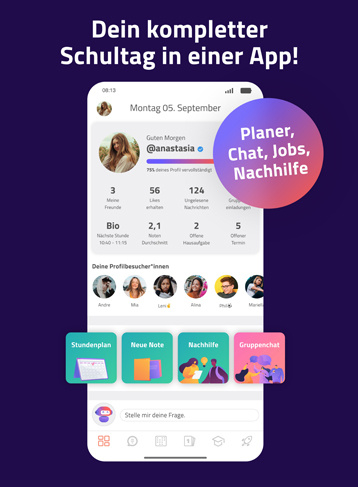Which Languages Should I Learn?
Choosing a new language to learn can be an exciting and time-consuming challenge. With so many options available, it can also be difficult to make the right decision. In this article, we’ll take a look at some of the most important criteria to help you choose a new language!

Here are 5 key points to consider when making your choice:
1. Interests: What excites and intrigues you?
A good starting point for selecting your new language is to consider which countries or cultures particularly fascinate you. Are you passionate about Japanese pop culture, French cuisine, or Spanish music? Learning the language of a country whose culture resonates with you makes the learning process more interesting and motivates you to keep going.
2. Career Prospects: What direction could your future take?
Some languages can be especially beneficial for your future career. In which field could you see yourself working, and which languages are in demand in that area? For example, knowledge of Mandarin or Spanish can be an asset in many professions, as these languages are widely spoken around the world. We’ll come back to this point later!
3. Spread: Can you understand me or is it all Greek to you?
Sometimes, it makes sense to learn a language that is widely spoken and commonly used as a second language. Such languages include English, Spanish, French, and Mandarin, as they have great global significance. Being able to communicate in one of these languages opens many doors in various aspects of life.
4. Difficulty
Another important factor is the difficulty of the language. Some languages share similarities with your native language, which can make learning easier. Others may present a bigger challenge due to their grammar structure or pronunciation. Consider how much time you can dedicate to learning a language and how motivated you are to take on a new challenge.
5. Travel Plans: Where do you want to go?
If you enjoy traveling or plan to study or work abroad, it might be a good idea to learn the language of your destination country. This allows you not only to integrate better while you're there, but it also opens doors to cultural experiences.
Additionally, to make it easier for you to choose, we have summarized the most popular languages in the world and their benefits. It’s important to note that the popularity of languages often depends on various factors, including the number of speakers, their spread, and their role in global affairs.
Here are the most popular languages in the world and some benefits that come with learning or speaking them:
Mandarin Chinese is the most spoken language in the world! Economically, mastering this language offers significant advantages. China has become a global economic powerhouse, and many international companies have close business ties with Chinese partners. Knowledge of this language can therefore be a valuable skill and expand job opportunities across various industries. Moreover, learning Mandarin Chinese provides a deeper insight into China’s rich culture and history. The Chinese civilization has a long tradition, and the language is key to understanding these cultural roots. In an increasingly globalized world, where China plays a significant role, learning Mandarin Chinese is not just a useful skill but also an enrichment for personal and professional development.
Spanish is not only useful because it’s the second most spoken native language in the world, but it is also the official language in many Latin American countries, allowing you to communicate with people from a wide range of countries. In today’s globalized world, Spanish has become an important language in the business world. Many international companies are focusing on Latin America, and knowledge of Spanish can enhance career prospects in various industries. The importance of the Spanish language extends to cultural areas, and Spanish is in demand as a foreign language in many educational institutions worldwide. Mastering this language opens opportunities to participate in exchange programs and international educational initiatives.
English is the world’s lingua franca and is widely used as a second language. You’ve probably had English in school, right? By diligently learning English, you have the opportunity to connect with people from different countries and cultures. Many international companies and organizations use English as their working language. Therefore, mastering the language expands career opportunities and creates diverse possibilities in various industries. English also provides access to a wealth of knowledge and resources. Most scientific publications, research papers, and technological developments are available in English, facilitating access to global educational materials and encouraging participation in international knowledge exchange. The language serves as the foundation for many cultural works such as literature, films, and music. Additionally, mastering English opens doors to international educational opportunities. Many prestigious educational institutions around the world teach in English, and language skills make participation in international exchange programs easier.
Hindi is one of the most widely spoken languages in the world and the official language of India. Learning Hindi makes sense, especially considering the significance and cultural richness of India. Economically, India is gaining importance, and knowledge of Hindi can therefore open career opportunities, especially in industries dealing with India and its growing economy. Furthermore, learning Hindi provides a deeper understanding of India’s diverse culture and history. India is known for its rich cultural tradition, art, music, and literature. It opens doors to a fascinating world full of history, traditions, and possibilities.
Arabic is not only the fifth most spoken language in the world but also plays a central role in the Middle East. With the increasing influence of this region in various fields, including business and politics, knowledge of Arabic can broaden career opportunities.
Portuguese is spoken in countries like Brazil, Portugal, and some African nations. With Brazil as an emerging economic power, mastering Portuguese can create career opportunities in international business relations. Moreover, learning the language provides a deeper understanding of the fascinating Portuguese culture and its unique diversity. Knowledge of Portuguese not only offers linguistic abilities but also opens doors to a wide range of cultural experiences and global networking.
Russian is the most spoken Slavic language and plays a significant role in Russian history and culture. Knowledge of Russian can open career opportunities in international relations and business negotiations. Moreover, learning the language provides a deeper insight into Russia’s rich literature, art, and traditions. Students who master Russian can not only communicate effectively with Russian-speaking communities but also benefit from a deeper understanding of Russia’s cultural diversity.
French is not only one of the most widely spoken languages globally but also an official language in many international organizations. Knowledge of French opens up career opportunities in diplomacy, international relations, and the global cultural sector. Additionally, learning the language provides a deeper understanding of French literature, art, and philosophy. Students who master French can not only succeed in various professional contexts but also enjoy a wide range of cultural experiences and intercultural understanding.
Ultimately, choosing which language to learn is a personal decision. It’s important to choose a language that aligns with your goals, interests, and abilities, as that’s the key to staying motivated. No matter which language you choose, learning a new language is a valuable investment in your personal and professional development. Good luck with your language learning journey, we believe in you!
Author: Team scoolio





